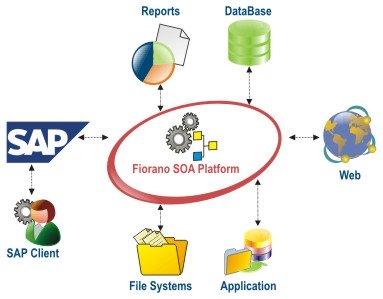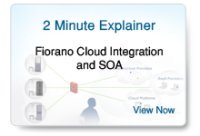
The requirement was to automate the entire workflow and speedup the business process. The first challenge was determining the enterprise architecture and second choosing a vendor. We evaluated several technologies and vendors and after a due diligence process and proof of concept over a period of 6 months we decided on implementing a Service Oriented Architecture (SOA), choosing Fiorano to deliver that technology to UB"
Customer Profile
United Spirits Limited (USL) is the largest spirits company in the world by volume, selling 114 million cases for the fiscal ending March 2011. Besides Whyte & Mackay and Bouvet Ladubay being 100% subsidiaries of USL, the company has 21 millionaire brands (selling more than a million cases a year) in its portfolio and enjoys a strong 59% market share for its first line brands in India. USL has a global footprint with exports to over 37 countries. It has a sizeable presence in India with distilleries and sales offices all across the country, and a committed team of over 7500 people dedicated to the fulfilment of the company's mission. It has established manufacturing and bottling plants in every state of India. In addition, to deliver its products to customers located anywhere in India, USL has established a robust distribution network covering the whole country.
With growing size and acquisitions, the IT infrastructure at UB Group has also grown both in size and complexity. To keep the push on the accelerator of growth, IT Managers realized that a unified application infrastructure with flexibility to adapt to frequent changes in business conditions was of the highest importance to align IT with business at UB. The new IT infrastructure should allow integration of existing legacy applications and seamless addition of new applications to the IT infrastructure.
Business Problem
UB Group deploys a wide range of software and hardware products to support its IT requirements. Most applications are deployed on one of three IBM i-Series, with different operating systems such as OS/400, 64 bit Linux and Windows supporting almost all its platform requirements. It also deploys a range of Wintel Servers along all locations. Enteprise software includes SAP with approximately 400 users, Websphere Portals, Lotus Notes, Click View for data analytics, databases like DB2 and SQL servers along with a range of java based applications to support different requirements and business processes. They have IT spread across 80 locations connected using MPLS, VSATs, and Leased Lines.
With a growing number of processes without any cohesive centralized management, distributed information in multiple locations and servers it was becoming increasingly challenging for the IT department at UB to provide meaningful and timely information to Management to take effective decisions and manage business processes across different domains. Data stored in the SAP systems was not available as intelligent information to senior management. A stable and efficient web services framework was required.
More over critical 24x7 processes required automation to meet industry demands. Application collaboration across the enterprise including the partner network was required to provide integrated and structured information; good data quality and unlocking silos of data was the pressing need to move ahead.
Solution
The Fiorano Solution was based on Fiorano SOA Platform. It is a SOA based middleware platform that allows application integration based on open standards like JMS, Web Services, JMX and host of JCA based adapters and bridges. The core of the platform is the Fiorano ESB which acts as the integration backbone. Fiorano Choreography Tools provide visual based process creation, deployment and execution from the same point. Other supporting tools like deployment manager and Service and Security manager provided the much needed security and management.
Among the many process that UB Group deployed using Fiorano, SAP integration was one of the key solutions that helped it save over a million dollars in a short span of time. Figure -1 below shows Fiorano's SAP Solution at a high level. The information in SAP can be pulled out and sent to the report generating tools using Fiorano SOA Platform without doing a single line of ABAP programming. This saved UB a significant amount in consulting costs of a SAP consultant who would normally be required for such a job; it also reduced software costs as now the Fiorano SAP adapter was able to seamlessly connect to SAP using just a single client license. The figure below shows one such flow where UB used Fiorano to pull out the information from SAP and send it to reporting tools.

FIGURE 1 : SAP Integration
Along with the ease of integration considerable amount of time is also saved in creating and deploying flows on Fiorano. Fiorano's advanced event-driven architecture allows the logical business process to be directly mapped to the physical implementation layer enabling business users to directly work with Fiorano tools. The event process created using Fiorano Orchestration Tool directly deploys the requiredqueues and topics for data exchange and in only needs simple configuration which can be done by business users without much IT intervention.
Fiorano SOA platform also provides comprehensive support for web services and related interface that allowed supplier and partner integration with UB. Fiorano pre-built adapters provide the key to enhanced interoperability with a wide variety of applications and technologies. UB was able to automate the entire help-desk for distillery sales and SAP auto forwarding using these pre-built components and services without any coding or custom development.
Benefits
Selecting Enterprise integration middleware for UB was a detailed and rigorous process of over 6 months that included a detailed proof-of-concept. After evaluating different solutions on the market. Fiorano came on top on the evaluation criteria selected by UB. Fiorano's key differentiating features for UB were:
- GUI based Orchestration tool that made it lot easier for people with little IT knowledge to work with Fiorano.
- The Orchestration tool itself provided remote deployment with a simple click for easy deployment on remote machine.
- Fiorano SOA Platform supported multiple platforms (Windows, Linux, UNIX, Solaris) providing the interoperability which allowed easy deployment across the enterprise across disparate environments.
- The suite of adapters and bridges (File reader/ writer, DB adapters, SAP adapters and many more) provided easy integration with almost all the applications participating in UB's business processes.
- The distributed nature of the Fiorano ESB, enterprise service bus provided linear scalability.
- The excellent peer to peer model with buy-as-you need pricing model provided greater ROI.
UB uses Fiorano flows to manage and automate all of the above processes. Some examples follow:
- Receiving Goods (GRN - Goods Received Notes)
When suppliers send goods to the manufacturer, a GRN (Goods Received Note) process is executed. The GRN process records all items received from the supplier (this can be a complex and comprehensive list of materials). This list is compared line by line against the original PO placed on the supplier. SAP then determines how much to pay the supplier (after verifying the goods provided by the supplier). At the end of the exercise, the Supplier Account is debited and the Bank Account is credited (within SAP, since SAP is recording how much money was paid to the supplier). At UB, the flow that manages the GRNs is implemented on Fiorano.
- Dispatch
When goods have to be dispatched (say, to distributors), then an Invoice has to be created (since the distributor has to pay for the goods). In SAP, the 'standard' invoicing process takes 5 steps and 9 screens, requiring 12 mins to complete typically. With the Fiorano flow, this changed to 1 step and 2 screens, requiring just 2 mins to complete. That's a savings of over 10 mins on each invoice creation.
UB creates over 5000 invoices per month, thereby saving over over 1600 man-hoursper month just on invoice creation alone. Moreover, the new solution allows the central head-office to process the invoices generated by remote factories, without requiring (skilled) people at remote locations from ever having to learn SAP or get trained on SAP. At remote sites, operators simply type in invoice details on an HTML page, and the Fiorano flows that process invoices handle the rest; updating the SAP system seamlessly and executing the 'business process flow".
People in the field no longer require SAP training and can now generate invoices accurately and easily on the SAP system. They are transparent to SAP which runs in the background controlled completely by the Fiorano flows. The process is very scalable. When UB's sales went up by over 18% last year, there were able to handle the increased invoicing volume without problems of any kind.
- Production
When complex products are manufactured, several raw materials are consumed as part of the manufacturing proces. For each manufacturing 'run', one has to list what is consumed, what is produced, alter the finished goods list, decrease the raw material quantity and report a variety of parameters including product cost, cost of production, etc. This whole process of tracking what is produced and consumed and reporting information on the production run is called the "Back flush" process within SAP.
UB uses Fiorano flows to extract information relating to the Back flush process and to publish this information to the enterprise portal, where it can be reviewed by managers for appropriate actionable decisions.
- Logistics and integrated approval mechanisms
Different distributors have different credit limits within the SAP system. If while picking up goods a distributor's credit limit is exceeded, SAP blocks the transaction until a manger either approves or rejects a request to increase the credit limit. In the traditional approach, the manager had to log into SAP and (assuming he/she knows how to navigate through the maze of SAP menus), manually approve/reject the request. It is not always possible for a manger to log into SAP (for instance, if the approval is required while the Manager is travelling or late at night or if there is no internet access).
UB solves this problem by using Fiorano flows to get the approval from a manager using his/her mobile phone. An SMS is sent to the GPRS-enabled cell-phone of the manager, listing a web-link. A Fiorano flow in the mean time extracts the relevant transaction to be approved and places it on the portal. When the manager clicks on the link in the SMS message, he is directed to a portal where he logs in and reviews the transaction, with the ability to approve/reject the transaction over the cell-phone. This obviates the need for the manager to log in physically into the SAP system and shields the manager from all SAP details - important because these details are archaic and difficult to learn.
- Invoicing detail
Besides cutting down processing time from 12 mins/invoice to 2 mins/invoice, the invoicing is integrated with more processes.
- Lifting plan: Each sales person normally provides an estimate of the sales he/she will possibly make over the quarter/year/fixed-term
- Bulk order: This is an estimate of what will be lifted in a larger order
The lifting plan and bulk order is compared against the Actual order and a Final invoice is generated. A report of the difference between the Actual order and the Bulk Order or Lifting plan is also created automatically - using Fiorano flows.
- New Regulations
UB implements several Fiorano flows to optimize revenue by responding to new tax regulations. An example is Service Tax. In the normal process, UB outsources several manufacturing tasks to third parties (Contract manufacturers). These CM's sell directly to UBs distributors, collect revenue and then pay UB back its share after deducting their contracted cost. Unfortunately, the payment from the CM back to UB came under the preview of Service Tax.
UB implemented a Fiorano process changing its business process to directly sell to the Customer, instead of through the CM while separately paying the CM for its services thereby minimizing the impact of Service Tax.
In all of the cases above, the ability of the Fiorano system to rapidly deploy business processes in a fraction of the time it takes to deploy processes on SAP was critical to UB's success. UB estimates that it has already saved over Rs 2.5 crores (US$ 500,000) in Year 1 of operation with a limited set of Fiorano flows. The investment in a Fiorano's modern, real-time, distributed architecture paid off many times over in a short span of under a year. These savings will be multiplied several fold in the coming years.
About Fiorano Software
Founded in 1995, Silicon Valley based Fiorano is a California Corporation with proven leadership in enterprise middleware and peer-to-peer distributed systems. Fiorano's innovative event-driven, dataflow SOA platform integrates applications and complex technologies into an enterprise nervous system, increases business process performance, yields higher message throughput and enhances availability through agent-based visual composition that bridges the capability gap between business models and their implementation - the model is the application, ready to run.
Global leaders including ABN AMRO, Boeing, British Telecom, Chicago Mercantile Exchange Group, McKesson, NASA, POSCO Steel, Qwest Communications, Rabobank, Schlumberger, Lockheed Martin, United States Coast Guard and Vodafone have deployed Fiorano to drive innovation through open, standards-based, dataflow SOA applications built in just days, yielding unprecedented productivity.
Fiorano Enterprise Service Bus (ESB) and Fiorano Message Queue (MQ) deliver the industry fastest, lowest latency, highest throughput real-time messaging (asynchronous and synchronous) to power high performance, highly available, and collaborative workflow applications whose application services are distributed throughout the IT landscape. Fiorano's distributed, peer-to-peer agents' abstract complexity of developing and deploying services to unlock value in a customer's enterprise architecture framework.
To find out more about how Fiorano can help you meet your enterprise integration objectives, visit www.fiorano.com or Email us, we will contact you!

 Japan
Japan Germany
Germany

